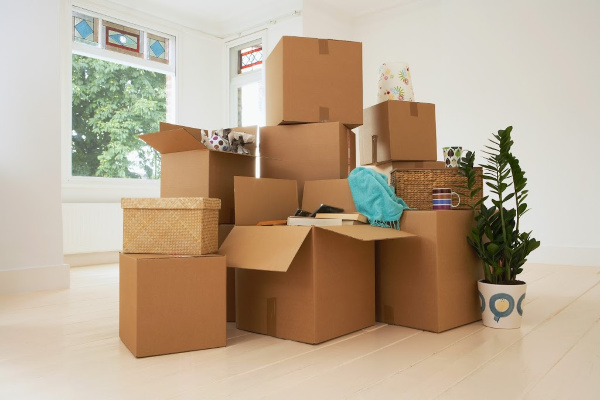Inside: Decluttering bloggers everywhere are encouraging us to declutter while we’re stuck at home. But is that really a good idea? And how can you declutter when we have no idea what the future holds?
Two weeks ago, our lives as Americans changed so much and so fast it’s crazy, isn’t it? Literally, overnight everything changed, and every morning we wake up to new changes.
Social distancing is here to stay it seems, and all of us are spending a lot more time at home than we ever have before.
And all this home time definitely puts clutter in your face 24/7.
I wasn’t surprised at all when every minimalist blogger I follow leapt at the opportunity to encourage their audiences to use all that at home time to finally declutter.
What a golden opportunity, right?
Your calendar is now [depressingly] clear. You HAVE to stay at home.
If you’ve put off decluttering, now could be the perfect time to tackle what you’ve managed to put off.
Except that’s not what I was thinking or feeling at first, especially not when the words “recession” and even “Great Depression” made their way into the headlines.
I started thinking of all the stuff we might need to keep, that I hadn’t thought of as valuable before all of this.
And I know I’m not the only one.
Related: How to Declutter When You Have No Time and a Tight Budget

Is Right Now Really the Best Time to Declutter?
What if your first instinct when the future is completely up in the air isn’t to declutter, but the exact opposite?
Even as a minimalist, the first thing I did when I heard all that Great Depression talk was to go through our “to be donated” box one more time – wanting to make sure I didn’t give away something we might truly need.
Another walk through its contents confirmed that yes, most of it truly was clutter, things we weren’t using and never would.
It wasn’t like there was a bag of rice or flour, or a case of toilet paper in there. (Who knew that rice, flour and toilet paper would become the new American currency?)
But then my thoughts ran to everything else I’d decluttered over the years, with just a tiny pang of regret – the pantry, the bookshelves, the craft supplies.
After all, aren’t all the non-minimalists kind of having the last laugh right now?
With their pantries full of non-perishable food – when you can’t find a bag of rice or flour to save your life
With their shelves full of books when libraries are shut down indefinitely.
With extra toys and activities ready to go for all that unexpected time at home.
I’m sure they’ve at least thought, “I told you so!” It definitely makes you question living a minimalist lifestyle for at least a few minutes.
Especially in times of uncertainty, the desire to hold onto your stuff increases tenfold.
You probably don’t really need or even use half the stuff you choose to hold onto, but it’s a little bit like the people buying a gazillion cases of toilet paper right now.
Clutter (and toilet paper, apparently) can be a security blanket, one of the few things you can control in a scary world where everything else feels so very out of control.
Who knows what the economy will be like six months from now? Who knows where you’ll be living? Will you have a job? Will you be unemployed indefinitely?
And how on earth can you know what to get rid of and what to keep when you have absolutely no idea what life will look like a few months from now?
Decluttering is Difficult When Your Income is Up in the Air
As 75% of Americans are under stay-at-home orders right now, a good percentage of those people have also lost their jobs.
And if there’s one thing I know for sure, it’s that decluttering is hard to do when you don’t know where your next paycheck is coming from.
A minimalist lifestyle is in many ways a privilege. It’s a privilege to let go of things you think you might need one day, a privilege to even have things to get rid of, to have enough income that you can even get a credit card to be able to rack up all those unnecessary purchases in the first place.
The very real fear that you might need it one day doesn’t go away when with the assurance that those things you might need to replace can’t cost more than $20 at the most.
The person arguing that $20 isn’t a big deal probably isn’t relying on that $20 to put gas in the car or buy milk and bread at the store or keep the lights on or the mortgage paid.
Financial uncertainty usually causes us to cling harder to the things we already have, and to pack our houses with stuff when it’s ridiculously cheap, even when we don’t need or want it all.
It’s what caused my grandmother, who grew up during the Great Depression, to take advantage of every sale at the grocery store, to always have a pantry jam packed with canned goods that often expired before she could use them.
Decluttering is Difficult to Do When You’re Anxious
Some might argue that because clutter can cause anxiety, decluttering is an obvious antidote to anxiety. And while yes, a clutter-free home does reduce anxiety, that result is the end of a long, hard-fought battle.
Decluttering takes hard work and a LOT of decision-making.
Making decisions is a million times harder when you’re anxious.
And even if you manage to make any at all, they aren’t always the best decisions. They might be ones you regret later.
Anxiety can make decluttering harder.
Why You Might Want to Declutter Right Now (Even Though It’s Hard)
So now you know I’m on your side – I totally empathize with you. Decluttering is hard for me right now, too.
But what if we could turn this time of massive uncertainty into a time of great opportunity?
What if now, after taking a few weeks to wrap your head around an uncertain future, is the perfect time to reevaluate your life? To figure out what really matters to you?
In a time when everything has been stripped away, when you’ve been forced to slow down, when you’re forced to look at your home with fresh eyes.
The eyes of someone who thinks you might not be leaving that house very often for the forseeable future. The house that is now a school, a workplace, a playground, a respite from the craziness of the world right now.
I read inspirational biographies to my kids every day, and what stands out to me in almost every story is that these people chose to see opportunities in the midst of incredibly difficult circumstances.
They made a choice to come out the other side better and stronger.
We have the same opportunity in the midst of this crisis.

A Super Simple Decluttering Plan for Uncertain Times
Decluttering changed my life.
It’s why I have time to earn an income online. Why I’m able to homeschool my kids and be home with them all day every day without losing my mind (o.k., sometimes I lose it, but not because of clutter).
I’d be doing you a disservice if I didn’t encourage you to do something that could completely change your life as well.
Make sure to give yourself some grace though, a week or two to wrap your head around the times we’re living in, time to dial down the anxiety. And obviously, if you’ve lost your job and are wondering where your next meal is coming from or whether you can keep a roof over your head, you have enough on your plate right now.
Because I know how scary decluttering can feel when you’re not sure what the future holds, I have a super simple decluttering plan for you. One that fits the uncertain times we’re living in.
1. Start with the easy stuff.
This actually isn’t all that radical or new. It’s what I normally recommend.
First, you’re going to want to do a clean sweep of your house with a garbage bag.
Throw away any trash or anything that’s broken – that you know you’ll never fix. Make sure to be honest with yourself about whether or not you will actually fix it, or if it’s even worth the time it would take you to try.
Related: 110 Things You Can Easily Declutter Right Now
2. Box up anything you don’t use on a daily and weekly basis.
Go through your house room by room and box up (or use paper bags or garbage bags) anything you don’t use daily or weekly. Make sure to label the boxes by room.
Box up things like…
Books you aren’t reading right now or don’t plan to read in the next few weeks.
Knick knacks or other home décor that’s non-essential to everyday life.
Makeup and clothes you don’t wear on a daily or weekly basis (well, think through what you wore and used regularly BEFORE you were home all the time – wink).
Go through your daily and weekly routines. What do (or did) you use all the time? What would you replace first if your house burned down? Keep those things out.
Store your boxes in the basement or somewhere out of sight. Obviously if you are in tiny apartment in New York City, that’s a bit tricky, but try your best!
Again, labeling by room is important so you can quickly find anything you might realize you need later.
Plus, it’s not like donation centers are accepting anything right now, anyways.
3. Reflect on and write down what truly makes you happy.
This is probably at odd ending to the decluttering process, but there’s a point here, so bear with me.
This is an exercise I discovered in THIS book about reaching financial independence. Its’ an exercise I think anyone who wants to live an intentional life – with their stuff, their time and their finances – NEEDS to do.
Grab a pen and paper, and write down the top ten things that bring you happiness. Really think about it – what makes you perfectly happy, brings a smile to your face?
The point of this exercise is to figure out what really matters to you.
You will probably find that most of the things on the list aren’t things, and if they are, they don’t cost that much.
But even the couple things that might involve physical possessions (a hobby or sport, for instance) or cost money to continue to do – now you know what they are.
Those 10 things are what’s truly worth spending your money on AND worth keeping for any physical possessions that take time and energy to maintain.
For example, if woodworking brings you joy, it makes complete sense for you to keep your woodworking tools.
But if reading didn’t make the list? Then why the HECK do you have so many books?
And why do you keep buying them?
Use this vacation from your stuff to figure out what truly matters to you. Because when things are a little more certain, when life returns to “normal”, maybe it will be better if you’ve established a new normal.

There’s Always Good – You Just Have to Look for It
This morning I looked up the exact dates of the Great Depression. It was shockingly shorter than I remembered.
August 1929 to March 1933.
Not even four years. I was picturing ten or more.
Obviously, the ramifications of the Great Depression stuck around for years, well after people considered it “over”.
It caused many Americans to live forever with a scarcity mentality, holding onto every little thing that might possibly be useful one day. The trauma that comes with joblessness and not knowing where your next meal is coming from can last a lifetime.
But the Great Depression was also a time when people learned to help each other, to depend on their friends and family and neighbors in a way they never had before. To give out of the little they had to someone who needed it more.
It was a time when gratitude took on a much deeper meaning. When giving thanks for your food was more than just a ritual, words said on repeat.
In what can feel like endless darkness, look for these little points of light.
Even during the darkest times in history, there was always good to be found. You just have to look for it.
Read Next: 8 Tips for Decluttering on a Low Income (from a mom who’s been there)


I would love to hear your thoughts on this more now that we’re at the other end of this tunnel. 💖
Hi Laura! Throughout these few years of insanity, there have been a few moments where I realized I let go of something I wish I’d kept. But it wasn’t a crisis. There was a brief pang of “dang it – why did I give that away!”. Then I moved on, figured out an alternative (got the book from the library, used a substitute, borrowed), and moved on. I still love the modified version of “we’re moving” decluttering, where you box up anything you don’t need or use every day by rooms, label with the date (and the room it came from) and only take things out that you miss or need. After a few months, you can give everything else in the box away. I hope this helps!
I so appreciate your honesty about minimalism on your blog. I have struggled with clutter my whole life, you can ask my mother. I could not do the Marie Kondo lifestyle, but I do follow Dana K. White of A Slob Comes Clean Blog, and my life is so much simpler now. Before everything happened I was getting rid of so many things, but I am glad I hesitated to get rid of school supplies given to me by my teacher mother because now I homeschool or co-teach with my sons’ teachers online. We can never know for certain what the future holds, but we can appreciate that sometimes other’s choices (like holding on to what seems like useless stuff) can be valid and useful. I have also had the opportunity to declutter things now that the main part of quarantine has lifted because I did what you suggested and began going through things and boxing them up in preparation for reopening. So thank you for giving that step when I felt I didn’t know where to start and I didn’t want to take everything to the city dump because it felt like a waste. There were some things that even in a scarce market we truly weren’t using and I hope they can bless others.
Thanks for sharing Andrea! I still struggle with that feeling of waste to this day. now that we have a bigger house, I feel less anxiety about keeping things for a bit longer to see if we can in fact use them. It’s definitely not the typical minimalist way, but if you stop the clutter from continuing to come in while you’re deciding – or at least significantly reduce it – you can still make decluttering progress. Good luck!
Those dates for the Great Depression? Those are the “official” dates, not the ones that real people, like my grandparents experienced. They moved from Salt Lake City, UT to San Diego, CA in 1934, about the middle of the depression because there was so little work in SLC and the weather was hard on my grandma’s health. The unemployment and the scarcity of both money and goods lasted until about 1942 with the US involvement in WW2 after the attack at Pearl Harbor in December 1941. Read some memoirs and personal histories–The Great Depression lasted over a decade.
I realize those were only the “official dates” and the effects lasted beyond the them for a lot of people. Thank you so much for sharing from personal experience though! That’s always so helpful to hear how it affected real people. My point was mainly that even if we di face another Great Depressionm, it won’t last forever, and there is hope and good even when things are super dark.